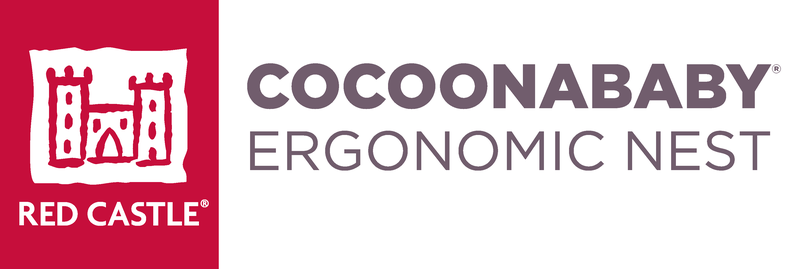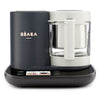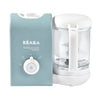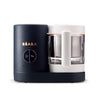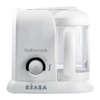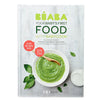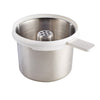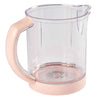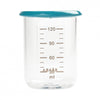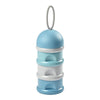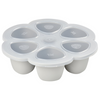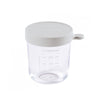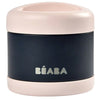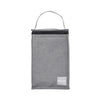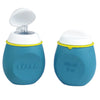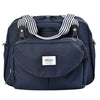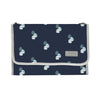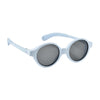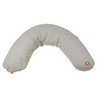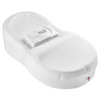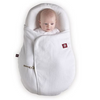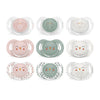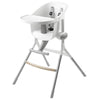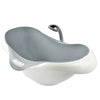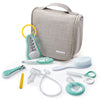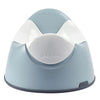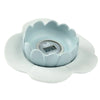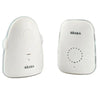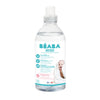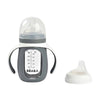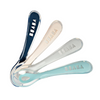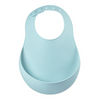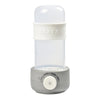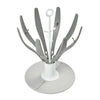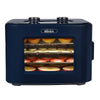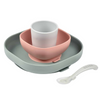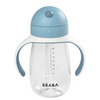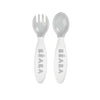It’s summer. It’s hot, or at least it is supposed to be …and you need to bear in mind the rising temperatures when feeding your little one, especially if you are just starting solids.
Most important thing: fluids and hydration
Babies and toddlers feel the heat too which means you will probably need to up their fluid intake. If you are still breastfeeding, your baby may want to nurse more frequently, so go for it and don’t forget to drink plenty of fluids yourself so your milk supply meets your baby’s needs and you don’t end up dehydrated. If you are bottle feeding, ensure your little one is drinking enough too by offering slightly larger milk feeds if it’s hot.
In warmer climates, it is recommended that a little cooled boiled water is given to babies to ensure they have enough fluids. If you are travelling to a hotter climate talk to your GP or nutrition professional about whether you should be giving your baby water. Just remember to always boil and cool your baby’s water and also, discard any leftover water in the bottle or beaker and thoroughly clean it at regular intervals because bacteria replicate much faster when it’s warm.

Fruit and vegetables and their very nutritional best
I bet you’ve noticed how some fruit and vegetables are at their juiciest in the summer – remember how plum juice always dribbled down your chin as a child?. Well, that’s Mother Nature giving us a helping hand: summer fruit and veg have a high fluid content to boost hydration in the heat especially for those of us lucky enough to live in hot climates! But hydration is only half the story, summer fruit and veg come in a variety of bright colours and the darker the shade, the higher the levels of antioxidants to help our cells fight free – radicals and stay healthy. But why so many different colours? Not just to keep our little ones interested in food, although they do help make food more attractive, but also because each colour is due to different health-boosting phytochemicals.
For example, the lutein and zeaxanthin1 that give tomatoes their bright red colour can support eye and brain development. Peaches are high in beta-carotene, which is responsible for their lovely orange hue and not only works as a powerful antioxidant but also as a precursor to vitamin A to support tissue, bone and cartilage health via collagen production. The humble pea is in season in summer too and when fresh straight out of the pod can be a delicious snack for babies. Peas are high in protein and contain good levels of iron and are therefore a great addition to vegetarian and vegan diets.
Seasonal fruit and veg are packed with vitamins and minerals: peaches are high in vitamin C to help support the immune system, potassium to help regulate blood pressure and niacin that helps metabolise food into energy and the antioxidant beta-carotene.
Watermelon, another summer favourite is high in lycopene and contributes tonnes of vitamin C to your diet.
Runner beans are also high in vitamin C and lutein to support eye health and vitamin K which helps blood coagulation.
So, the summer months are a great time to get your kids’ nutrient and antioxidant reserves stocked up for the winter. And the freezer too with our easy tricks below:

Summer fruit and veggie hacks:
We like batch-preparing and freezing summer fruits to stock up the freezer with compotes, chia jams and frozen fruit purées: peaches, plums, cherries, strawberries & melon.
Tomatoes are at their best in the hot, summer months. We just put them through the Babycook ® with a good glug of extra virgin olive and freeze it in small portions to use in the winter when tomatoes are not in season and therefore have much lower nutrient levels – and do not taste nearly as sweet!
Peppers are simply amazing this time of the year, so why not buy four juicy red ones, brush them with olive oil and roast them at 190C with 2 red onions, peeled and cut in two and unpeeled garlic cloves until nice and soft, then put the peppers in an airtight container for 10min so the skin loosens up a little and they are easier to peel. Remove the skin and seeds but don’t wash them to avoid watering down the flavour, put them in the Beaba Babycook ® with the onions and peeled garlic, 2 tbps mascarpone and you’ve got an amazingly tasty meal.
Summer fruits like raspberries, blueberries, mango and nectarines are sweet and soft so they make great finger foods to introduce your baby to self-feeding or as part of baby-lead weaning – just watch them closely!
Summer days can be hot so you can use fruit and veg to hydrate and keep cool: smoothies, sorbets, coolers, ice lollies or juices well diluted with iced-water.

Freeze fruit purées in ice cube trays and use them to cool down porridge in a flash.
Remember foods spoil so much quicker when it’s hot and your baby’s gut may still not be mature enough to handle bacteria so ensure you keep foods well refrigerated and if you are out and about, don’t forget your Isothermal Meal Pouch.
Get creative: make a watermelon gazpacho…a divine combination for little (and big!) kids. Here is our 5 minute recipe: remove the seeds of approximately 200g of watermelon. Chop in small chunks and blend, in batches, until it starts looking juicy, add 200g of cherry tomatoes and blend again until you reach the consistency you like. For very young babies you may want to sieve the juice. Add 2 tsp extra virgin olive oil some basil and mint and blitz again. Refrigerate for 30min or longer. Serve with a straw for little ones to enjoy!

Summer fish: seasonal omega 3 for baby
Summer food is not just about fruit, some really tasty fish are in season too including mackerel, sea trout and plaice. We love mackerel as it’s a fantastic source of omega-3 with lower levels of mercury than tuna and salmon because it doesn’t grow to such a large size and therefore eats significantly less mercury-containing smaller fish. Omega-3 is an essential fatty acid that research has found supports brain and eye development.
Mackerel can be bony but it is worth the hassle of painstakingly removing the bones. We ask our lovely fishmonger to gut, scale and remove the large bones from our mackerel, we give it a good wash and cut it into small pieces, removing any remaining bones, and gently steam it in our Babycook ®. Once cooked, we blend the fish with some steamed potatoes (In the Babycook ® too), some wilted spinach and a generous drizzle of extra virgin olive oil for babies 7-9 months. For older babies, we check for any remaining bones after steaming, drizzle with olive oil and a little lemon juice and serve with smashed steamed potatoes (skin on!) and some fresh peas. Brilliant for self-feeding or baby-led weaning. If you are lucky enough to have any leftovers, mix the fish, potatoes and peas and mash them all a little, add enough beaten egg to make little patties and either steam them in your Béaba Babycook ® or brush with refined olive oil and bake at 180C for 3 minutes each side. You can serve these fish bites with some of our Tomato Salsa
It’s BBQ season!
BBQ season is upon us but remember that although little ones love a bite or two of mummy’s hamburger, burgers, sausages and hot dogs are quite salty foods and can contain high levels of preservatives. Our advice? Not for now, just avoid BBQ’ed food until your little ones are at least 12 months old and still keep an eye on the salt levels.
Written by Purple Carrot Nutrition: https://purplecarrotnutrition.co.uk/
